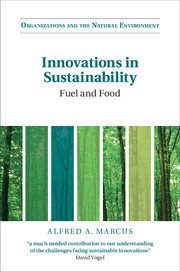Book contents
- Frontmatter
- Dedication
- Contents
- List of figure and tables
- Foreword
- Acknowledgments
- Introduction the path to sustainability
- Part I Funding sustainable startups
- Part II Business models
- Part III The macroenvironment and industry context
- Part IV Finding customers
- Part V Competition between mission and non-mission based businesses
- Concluding observations: the journey continues
- Index
Introduction - the path to sustainability
Published online by Cambridge University Press: 05 August 2015
- Frontmatter
- Dedication
- Contents
- List of figure and tables
- Foreword
- Acknowledgments
- Introduction the path to sustainability
- Part I Funding sustainable startups
- Part II Business models
- Part III The macroenvironment and industry context
- Part IV Finding customers
- Part V Competition between mission and non-mission based businesses
- Concluding observations: the journey continues
- Index
Summary
The path to sustainability has not necessarily been paved with gold, though many hoped it would be. They discussed the wins available for society and wins available for businesses. The wins would be new ways of eliminating waste and introducing novel products with unique features customers would value. They viewed sustainable innovation as a sound business proposition and challenged businesses to take this road not only because it was in the vital interests of society but because it was a sound business proposition. If businesses were going to fulfill their moral obligation to society and simultaneously pursue their obligations to their financial backers and other constituencies, then they had to engage in sustainable innovation. Since the articulation of this idea more than 20 years ago, many businesses have taken up this call in whole or in part. Very few have entirely resisted it. Whether their efforts were completely sincere was the topic of Frances Bowen's book After Greenwashing.
The aim of this book is to examine the experiences particular businesses have had with sustainable innovation during this period in order to assess and learn from these experiences and more importantly to consider the challenges that lie ahead. One element appears not to have been taken sufficiently seriously by the many previous champions of sustainable innovation. That element was risk and the importance of strategic choice in an environment of uncertainty. Like innovation of any kind, sustainable innovation has been a bet on the future. With respect to the future, humans – no matter how keen or shrewd – have limited forecasting capabilities. Their decision making is guided by passion and gut instinct as much as it is by rational calculations, and they make mistakes no matter how well intentioned they may be.
- Type
- Chapter
- Information
- Innovations in SustainabilityFuel and Food, pp. 1 - 10Publisher: Cambridge University PressPrint publication year: 2015

